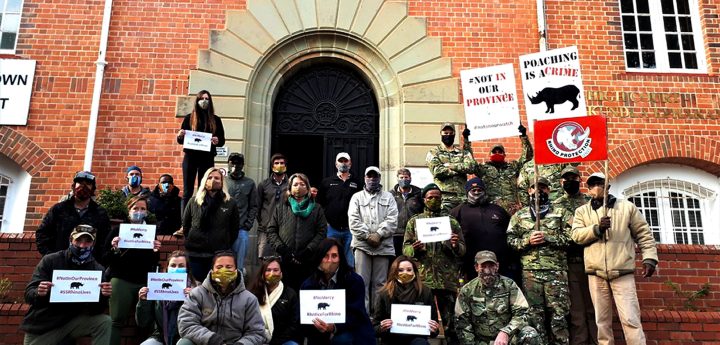Maverick Citizen: Eastern Cape
Rhino activists protest as convicted poachers ask to be set free on a legal technicality

For six years, the Eastern Cape was in the grip of a series of brutal rhino poaching incidents that traumatised many rhino owners, veterinarians and conservationists. This week, a full bench of the Makhanda High Court was asked to set three men, known as the Ndlovu gang, that were linked to a large number of these incidents, free on a technicality. Concerned and fearful of the consequences, rhino owners, workers on game reserves and Dr William Fowlds, who had to do the autopsies on many of the animals, staged a protest outside the court.
“All we are asking for is a judicial system that works,” veterinarian Dr William Fowlds said this week as he, and a group of game reserve employees and conservationists staged a protest outside the Makhanda High Court.
Inside, the judges who originally planned to hear the matter in chambers due to Covid-19, agreed to have oral arguments for the appeal heard in open court with a limited number of members of the public sitting in.
The appeal they were hearing held great significance for the group of protesters outside.
After a trial that lasted three years, Jabulani Ndlovu, Forget Ndlovu and Sibusiso Ndlovu, were convicted on various charges relating to 10 different incidents of rhino poaching in the Eastern Cape specifically in Albany, Jansenville, Graaff-Reinet and Cradock.
Their last rhino, Campbell, was killed on Bucklands Farm in Albany in 2016, four rhinos were killed on Koffielaagte in Jansenville in 2013, six were killed in three different incidents between 2014 and 2015 on Mount Camdeboo, two were killed on the farm Klein Doornberg near Cradock and another three on Spekboomberg in the same district.
The men were sentenced to an effective 25 years’ imprisonment.
Most of the rhinos died as a result of the high quantity of tranquillisers used to dart them.
The men were arrested on 17 June 2016 inside a chalet at the Makana Resort in Makhanda. During their arrest, the police found a horn that had been freshly removed, a dart gun, darts, tranquilliser, a saw, .22 blank ammunition, knives, a set of pliers, a drill, six cellphones and a SIM card.
The horn belonged to Campbell and Campbell’s DNA was found on the saw.
Cellphone tracking and evidence about the dart guns were also presented to link the different cases and strengthen the state’s case.
The men’s legal team is now asking the court to overturn their conviction, claiming that the search and seizure by the police was conducted without a warrant.
The court heard that the police were following the men, but that they had to act fast when there was an unexpected confrontation.
In his initial judgement, Judge Jeremy Pickering found that the evidence seized by the police was admissible, but the Supreme Court of Appeal granted the four men leave to appeal this part of the ruling.
Despite having the same surname, the three men are not related.
Jabulani, 41, is married with five children and ran a business in Edenvale exporting goods to Zimbabwe. A Zimbabwean national, he has lived in South Africa since 1997.
Forget, 39, lived in Pacaltsdorp in George, and was raising and selling chickens when he was arrested.
Sibusiso, who lived in Motherwell in Port Elizabeth was a taxi driver and used to install aluminium windows.
Summarising the cellphone tracking evidence against them, Pickering wrote in his judgement as follows:
“It is relevant in this regard that [Jabulani] lives in Port Elizabeth; [Forget] lives in Pacaltsdorp, George; and [Sibusiso] lives in a shack in Motherwell, Port Elizabeth. They have no overt connection to Grahamstown/Makhanda, Cradock, Graaff Reinet or Jansenville. They were portrayed … as not being possessed of any appreciable assets although it was common cause that each owned or had access to a motor vehicle, a GTI Golf, a Toyota and an Audi. Despite this, the accused felt impelled every few months, when the moon was waxing full, to hire motor vehicles, including expensive models such as a Mercedes or an Audi, and to travel many kilometres from their homes in Port Elizabeth and George into the Eastern Cape hinterland, seemingly for no ostensible reason other than to drive around the Karoo and to SMS and phone each other at extremely odd hours of the day, night and early hours of the morning such as 1am or 3am in the vicinity of scenes and at times where rhino happened to be poached. The accused gave no explanation for their highly suspicious conduct in this regard and it is difficult to conceive what innocent explanation for such conduct might be.”
Fowlds said that it took a lot of very hard work from the police to arrest the three. The police operation was called Operation Full Moon.
“So many rhino poachers have been let out on bail and rearrested again. There are multiple cases like that. We are proud of the efforts of our law enforcement teams and our prosecutors. If this goes wrong now, it will take the life and soul of so many people – it will be incredibly deflating,” he said.
“It took us six years to arrest them. It will be heartbreaking if this now gets taken away from us over a technicality.”
“We believe that before their arrest in 2016, they were involved in far more cases than these that they have not been charged for. They were so prolific that we always assumed that there were four or five teams of poachers using darts to poach rhino. But since their arrest, I am not aware of a single darting incident in the Eastern Cape.
“They became very skilled at poaching rhino,” he said. “The earliest one we know about was in 2011, but they were only charged from 2014 because of the availability of cellphone records. If you look at their modus operandi, you can see how they improved their skills. At first, they could only kill and take the horn from one rhino. By the time we caught them, they were doing four a night,” he said.
He said apart from killing the rhino and removing their horns, the members of the Ndlovu gang also flew up to Johannesburg to deliver the horns. “We consider them to be high up in the gang. They were the shooters and the delivery people.
“It was a huge achievement for us to get them convicted. We were in court for three years,” he said. “In my mind, you could not get a more cut and dried case of being caught with the evidence, but now they are challenging their conviction because the police did not have a warrant of arrest.”
He said previous court cases have not instilled a sense of hope that the gang will remain behind bars for a long time. Referring to the case of one Thai national who was sentenced to 40 years, he said the man’s sentence was reduced to 30 on appeal, to 20 on another appeal and eventually, he was released after six years.
In another case, the trial of a gang of rhino poachers has been delayed for 11 years. “This is why we are petrified,” he said.
The group has been spreading word about their protest on social media by using the hashtag #notinmyprovince. The phrase was coined by Premier Oscar Mabuyane during a march on International Rhino Day. “It was the first time that I know of that a political leader marched for the rhinos,” Fowlds said. “He managed to galvanise the support of many people.”
Fowlds said despite their concerns that the men would be a flight risk, they were given bail. “Amazingly they stayed right until the end. They are in custody now,” he said.
Rhino owner Ayesha Cantor from Kragga Kamma Game Reserve said they were also still waiting for the men who killed a rhino cow on their property to go on trial.
“We haven’t had a single case in the Eastern Cape this year [2020]. I think lockdown helped a lot because the borders were closed, but now we are on high alert,” she said.
“It is very frustrating for us to see how much it takes to make an arrest and then fear that a single swipe of a pen by a judge can undo all of that.”
Cantor, who attended the whole trial, said she was struck by the arrogance of the convicted men. “Any poaching is a highly traumatic event. I will never forget when Dr Fowlds had to do the autopsy on our rhino. It was a horrific crime scene. They had to cut pieces from her body to get to the bullet,” she said. DM/MC



















